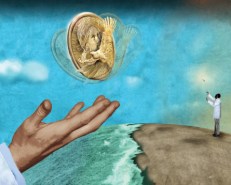Feature
-

Quantum weirdness
Here are some key concepts in quantum mechanics experiments — and how those concepts play out in the real world.
By Tom Siegfried and Laura Sanders -
 Quantum Physics
Quantum PhysicsLike fate of cat, quantum debate is still unresolved
Entanglement is now one of the hottest research fields in physics. It is pursued not only for insights into the nature of reality, but also for developing new technologies.
-

-
 Quantum Physics
Quantum PhysicsClash of the Quantum Titans
After decades of debate, disputes over the mathematical rules governing reality remain unresolved.
-

Iron in the Mix
Scientists look for the secret behind high-temperature superconductors.
-

Massacre at Sacred Ridge
A violent Pueblo incident sparks debate regarding prehistoric genocide.
By Bruce Bower -

Smoke from a Distant Fire
Burning forests can send aerosols into the stratosphere and around the world.
By Sid Perkins -
 Life
LifeMolecular Evolution
Investigating the genetic books of life reveals new details of 'descent with modification' and the forces driving it.
-

-

The Why of Sleep
Brain studies may reveal the purpose of a behavior both basic and mystifying.
-

-

Dying to Sleep
Getting too little sleep can impair body and brain and could even be deadly.